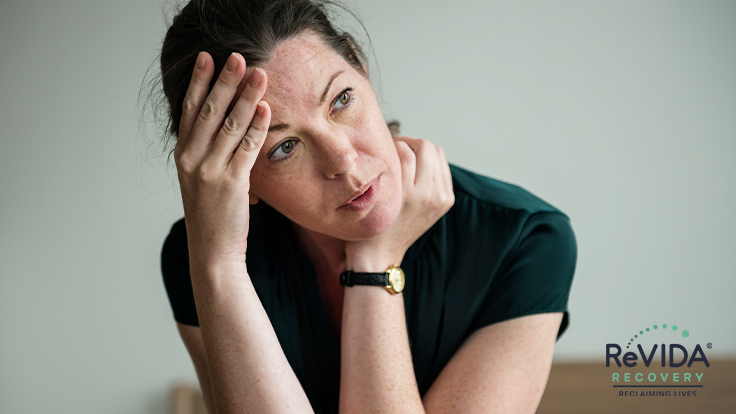
You drink a few drinks at a party before a friend of yours offers you some opioids. You take the substance because your friend says you will have more fun. However, after some time passes, you feel like you are stumbling and more dizzy than you usually feel after a few drinks. Your breathing is becoming more difficult, and you need to sit down. Before you become unconscious, you hear someone say, “Call 911.”
The following day, you wake up to a kind-looking doctor informing you that you experienced an overdose. You wonder how that is possible because you didn’t take much of either substance last night. The doctor tells you that mixing alcohol and opioids is very dangerous.
In 2019, 832 people in Tennessee died from an overdose because of the combination of two or more substances. Two common substances that are often combined are alcohol and opioids. At ReVIDA® Recovery, we offer same-day appointments, which allow people to get the help they need when they need it. We also like to spread awareness of what happens when people mix substances. Today, we are going to discuss mixing alcohol and opioids.
Table of Contents
The Influence Alcohol and Opioids Have on the Body
Alcohol and opioids on their own can affect the body in different ways. For example, doctors may prescribe opioids to help control pain. Sometimes, people will take opioids illicitly to produce euphoria. Taking too many opioids can result in an overdose. On the other hand, alcohol can also impact the body as it can only break down one serving of alcohol in 1 hour. Drinking more than this can result in the backup of alcohol in the body, which may result in liver disease, dehydration, and malnutrition, to name a few.
When you combine alcohol with other substances, especially with opioids, it can be hazardous. The substances can be unpredictable when they combine more so than alone. The use of alcohol and opioids together can result in overdose, injury, violence, and risky behaviors.

Exploring the Consequences of Mixing Alcohol and Opioids
Anyone can experience dangers and other side effects when they decide to mix alcohol and opioids. However, some factors can make someone more likely to mix alcohol with opioids. For example, younger people are more likely to participate in using opioids at the same time they drink alcohol. Males are more likely to use opioids and alcohol at the same time. Also, people who regularly binge drink are more likely to introduce substances such as opioids into their system at the same time. Having these risk factors does not mean you will participate in using opioids and alcohol at the same time. It only puts you at a higher risk.
Mixing alcohol with opioids is always a dangerous combination. Even if someone takes one serving of both alcohol and opioids, it can result in slow or stopped breathing. When this happens, your brain does not receive the oxygen it needs, and different organs may shut down. People who mix alcohol and opioids may experience coma or death. They can also experience several other symptoms that may be short-term or long-term.
Mixing Alcohol and Opioids: Short-Term Effects
After consuming alcohol and opioids together, you might experience some short-term side effects. For example, people may experience nausea or vomiting after they use opioids and alcohol together. In comparison, other people may feel dehydrated. They might also experience a change in their blood pressure. Others experience dizziness or loss of coordination. Combining opioids with alcohol can worsen one’s inhibition more so than if they had only had alcohol. It may also make you more likely to engage in activities you usually would not engage in.
Mixing Alcohol and Opioids: Understanding the Long-Term Effects
People can also experience more serious, long-term effects due to mixing alcohol with opioids. It can increase heart concerns, or you may encounter a coma or death. Regular use of mixing alcohol and opioids may put you at an increased risk of seizures. It can also result in long-term damage to your liver, heart, and brain. You may also experience long-term memory loss that may look similar to or eventually lead to dementia with repeated uses. This memory loss occurs because alcohol and opioids make it challenging to form new memories on their own. When you combine them, this can cause the side effects to be worse.
Mixing Alcohol and Opioids Overdose Explained
The most common concern when it comes to combining alcohol and opioids is that the action increases your risk of an overdose. An overdose is a medical emergency because of its potential to be fatal.
People who experience an overdose may experience several symptoms. For example, they may not be able to respond to you, or they may appear to be drowsy. Some people may experience a seizure during an overdose where they combine alcohol and opioids. People experiencing an overdose may have shallow breathing or are not able to breathe at all. Their respiration rate may be around 4-6 breaths a minute. They also may appear to be wheezing. Nausea and vomiting are also common experiences people will have when they are experiencing an overdose. Due to this, lay people on their side if they are experiencing an overdose because it can help them not choke on any vomit they might have. In rare cases, people who have combined alcohol and heroin may have temporary hearing loss during an overdose.
But what steps should you take if someone is experiencing an overdose? It is important to remember that the best thing you can do is to remain calm throughout the situation. Before you do anything else, call 911 and stay on the line. Help will be on the way, and by staying on the line, you can relay any changes to the 911 operator. They will also be able to let you know what exactly they would like you to do to help them as you wait for first responders to arrive. If you have Narcan® (naloxone) available, administer it immediately. You can administer the medication while waiting for professionals to arrive.
When the first responders arrive, you will want to be able to give them all the information you can provide. Questions they might ask you include, “What substances did the person take,” “How much did they take of the substances,” and “Should anyone else be contacted?” In Tennessee, the Good Samaritan Law allows you to seek medical assistance for people that are in danger of overdosing. You will not get into legal trouble for helping someone who is experiencing an overdose due to mixing alcohol and opioids.

Opioid Use Disorder Treatment Available at ReVIDA® Recovery Today
It can feel like you are staring up at a mountain when considering opioid addiction treatment with Suboxone. One that feels impossible to climb, especially on your own without any aid. You may feel like you don’t have the proper tools, companionship, guidance, or safety precautions to climb this mountain. Rest assured in knowing those resources are available to you, and you do not have to climb this opioid recovery mountain on your own. Seeking treatment can allow you to gain the skills and tools to help you along your journey. You will also gain relationships with people who will be with you every step of the way.
ReVIDA® Recovery has several locations throughout Tennessee ready to help you reclaim your life from substance use disorder. We understand that a return to use can happen following treatment, so we will always welcome patients back for whatever reason, including if you need additional support. If you have questions or are ready to start opioid use disorder treatment, please call us at 423-631-0432 today.
FAQs About Alcohol and Opioids
Is having one or two drinks OK?
On its own, without the use of opioids alongside it, one or two drinks every once in a while in moderation is okay. However, any amount of alcohol with opioids can be hazardous. So, you should not drink any alcohol if you are taking opioids. When even a tiny amount of alcohol and opioids interact with each other, they can become unpredictable and result in slowed or stopped breathing.
When can you start drinking alcohol after taking opioids?
Drinking alcohol any time after taking opioids is considered dangerous. There can be severe side effects when someone has decided to use opioids and alcohol around the same time.









